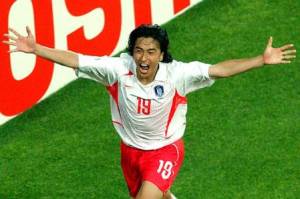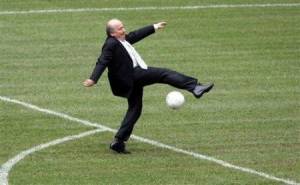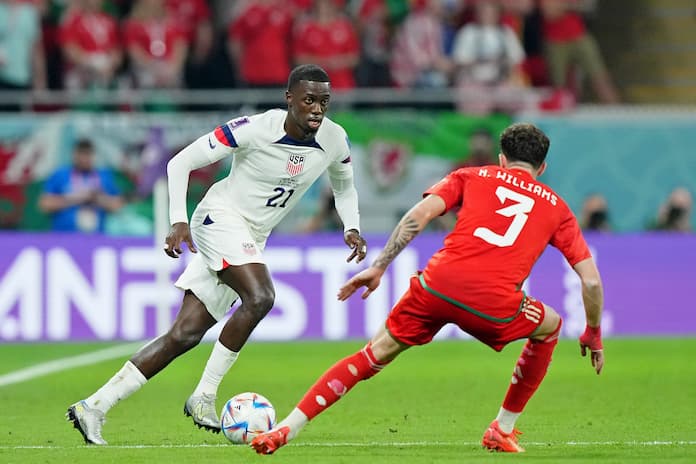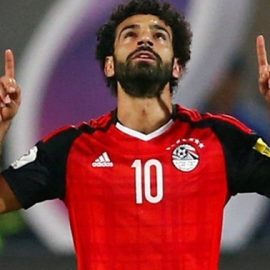On Saturday 28th February 2004, the International Football Association Board (IFAB) chose to abolish the ‘golden goal’ rule – six years after it was first utilised during a World Cup tournament in 1998 – as a means of deciding knock-out phase matches.
The ‘golden goal‘ rule (or the less heart-breaking ‘silver goal‘ rule, as it was at the time of it’s demise) was used on an ad hoc basis within the global game, as it was not a blanket or compulsory stipulation.
After consulting national associations worldwide, the IFAB (the body responsible for governing the laws of the game) eventually chose to scrap it in favour of a more homogeneous format – the now customary 30 minutes of extra time, followed by a penalty shoot-out.
Speaking after the rule change was announced, David Taylor (a member of the IFAB panel) explained their freshly altered stance;
“The important thing was to have clarity and to have a single method to determine the outcome of a match. The question was, where would we draw the line? Would there later be a bronze goal and then something else?”
At the time it seemed that most of the footballing world was in favour of the return to a more prosaic format.
The Italians were especially prominent in vocally supporting the amendment, which is fairly unsurprising given the manner in which they conceded defeat to France in the final of Euro 2000 (thanks to David Trezeguet‘s extra-time winner) or in which they were dumped out of the 2002 World Cup when Ahn Jung Hwan‘s ‘golden header’ saw South Korea progress past them and into the quarter-finals.
The rule change was greeted with a generally positive mixture of mitigation and relief, as the overly-complex and convoluted rules that has confused so many during their brief tenure were superseded by the warm, fuzzy familiar protocol of yesteryear.

Skip forward six years and it seems that international tournament football may be on the brink of another relapse – such is the cyclical nature of ‘foward thinking’.
It is an inescapable truth that the majority of the games at this summer’s World Cup in South Africa were tiresome dirges. The fact that it is far easier to pick out the group stage matches that didn’t make you want to pull your fingernails out than those which did is brazen testament to the cautious, ultra-conservative way in which many of the ‘lesser’ nations (i.e. those which were, to put it politely, ‘well-drilled but limited’), along with a worryingly high percentage of the supposedly ‘major’ ones, went about their business.
Obviously there were certain encounters that were fraught with excitement and tension, but the overwhelming majority of games throughout the tournament left many impartial observers cold – a fact not lost on FIFA president Sepp Blatter.

Blatter has revealed that football’s governing body (who hold four of the eight votes on the IFAB) are currently mulling over ways to rejuvenate the knock-out phases of the World Cup amidst fears that, with so much riding on results, teams are now prioritising ‘not losing’ above actually attempting to secure a victory.
It would appear that the various FIFA think-tanks have managed to produce two possible solutions so far, the first being the scrapping of extra-time altogether (and heading straight to penalties), which would unceremoniously remove all of the tense, fatigued and nervous jeopardy that accompanies a game moving into it’s second phase and therefore shouldn’t really be considered as an option.
However, their second suggestion is a little more enticing – with Blatter revealing that he is planning to air the concept of the re-introduction of the ‘golden goal’ rule at the next IFAB conference.
The Swiss dumpling told FIFA.com;
“We have to try to find a way to encourage free-flowing football in tournaments like the World Cup, with teams playing to win. We plan to take the opportunity to look at the concept of extra-time as well.
Often we see teams set themselves up even more defensively in extra-time, in an attempt to avoid conceding a goal at all costs. To prevent this, we could go directly to a penalty shoot-out at full time, or reintroduce the golden goal rule. We’ll see what emerges from the committee meetings.”
Blatter also admitted that he had noticed many teams were playing for a draw from the very first whistle in South Africa, an ultra-defensive, anti-football tactic which he hopes the new rule changes would serve to undermine;
“Football has become such a strategic game, with teams moving as a unit. It can be an impressive sight; gone are the days of simple tactics where you attacked then defended.
But in the first few matches of the group stage in South Africa, we witnessed some teams that went out to avoid defeat, that were playing for a draw from the outset. This is a topic that I would also like to discuss at upcoming Football and Technical Committee meetings.”
Which leads me to pose a serious question, the answer to which may leave you deliberating on your once-staunch belief that you are a right-minded, cognitive individual.
Are you, as I am, finding yourself in the unenviable position of siding with Sepp Blatter?
Don’t worry, I won’t tell anybody, and I suppose even a stopped clock gets the time right twice a day.
Add Sportslens to your Google News Feed!






